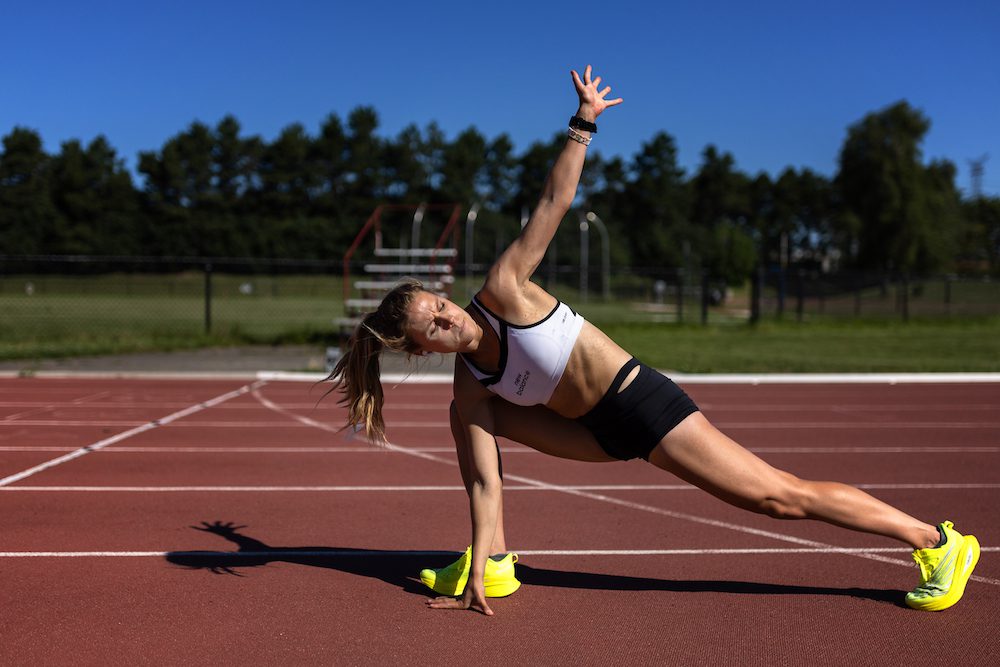Erin Teschuk was going to have a wild summer, whether she made the Olympic team or not. Between racing and a quick vacation in Europe, the 29-year-old New Balance runner was also finalizing preparations for one of the biggest moments of her life so far: defending her master’s thesis. When she didn’t make the team for Paris, there was sadness—but also, excitement about her dissertation, which kept her motivated.

An impressive number of elite women athletes have advanced degrees, and Teschuk has used her research to inform her own running and goal-setting. She’s focused on REDs (Relative Energy Deficiency in Sport) and how coaches can best support young athletes in preventing underfuelling and overtraining, and she’s passionate about spreading that message. At the same time, she’s not quite ready to hang up her running shoes—but she has changed how she looks at the sport.
Here, we caught up with her to find out how the idea of Run Your Way has changed for her over the years, and how she views the sport today.
First, we needed to know: was defending her master’s thesis more or less scary than racing at the Olympic trials? “Definitely less,” she says. “I think being elite athlete helps with things like this, because everything you do after racing is a relaxing walk into the park! With my thesis defense, if I completely messed up, I could just schedule a new defense. Compared to the high stakes of an Olympic trials, there’s no question which is more stressful. With trials, it’s what you’ve been training for for four years, and it’s coming down to 15 minutes. I love it for that reason.”
Going for an advanced degree while racing professionally is a balancing act, but one that can work well for some athletes. Teschuk is one of them. “For several years, running was my only thing, and I don’t think it was great for me,” she says. “If it’s going well, then it’s fantastic. But if it’s not going well, you’re in this pit of despair where you’re like, This one thing in my life is sucking, and I don’t have anything else. For me, it helps to have multiple things that I’m doing. That way, I don’t overthink running. If you have a workout that doesn’t go great, you have to move on from that, because you have homework—you can’t just fixate on it for the rest of the day. Having other passions outside of running has been really helpful for me, and it makes me a better runner.”

This year, Teschuk knew that to make the Olympic team—her goal for the last four years—she was going to need to have the race of her life at trials. That kind of pressure can crush an athlete, or it can push them to perform. She says she approached the race the best way she knew how–running as fast as she possibly could.
“I was in a position where I knew it was going to take my best and then some to make the team,” she says. “So obviously, I wanted to make it. But if you think about the question of, how do you make a team? the answer is simple. You make it by having the best time, which you get by racing at the best races. So I knew that if I wanted to make the team, I’d have to run the fastest I can in the best races I could get into. That was the only pathway, and it was either going to be enough for me to make the team, or it wouldn’t be. So I had to just stay as present as possible in every race and just race my best.”
Track Olympian Micha Powell: what “Run Your Way” means for me now
Unfortunately, she didn’t make the team, but that hasn’t dimmed her passion for running, or her determination to continue on her path as a pro. But, in the past year or two, how she defines what she wants from the sport has changed. And with where she is now in life and running, has the idea of “Run Your Way” changed? Definitely.
“It’s changed so much for me,” she says. “When I hear ‘Run your Way,’ it’s all about your purpose and the reason you run. For me, that’s changed throughout my life and career. When I started running, it was because I was fast and I was good at it, so it was easy and simple. As I’ve gone through it and gotten more competitive, my purpose became about finding out how good I could be, having that curiosity. Now, I’ve been doing it for for a long time, and I’m at this point in my career where I’m not at all ready to retire, but I am looking at the sport differently and asking different questions.
“Now, I’m thinking about how I want to make our sport better and how I can help other athletes. Being an athlete can feel a little bit selfish, because you have to be so focused on yourself. But now, my view has widened and I still have that drive to perform at the highest level, but I also want to leave the sport better than it was when I entered it.”

